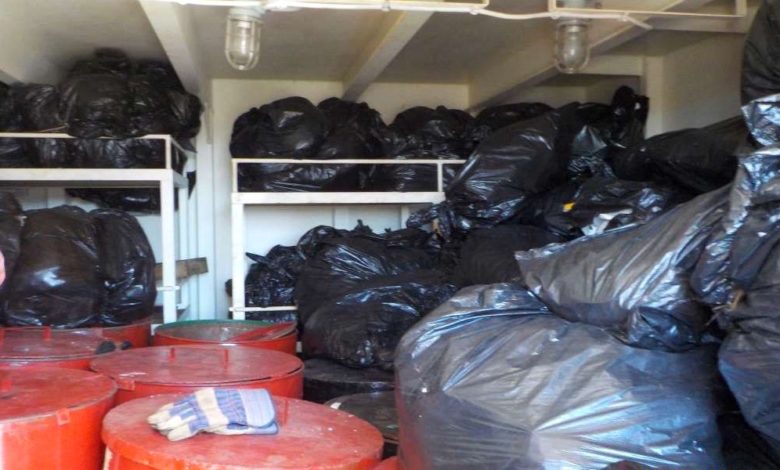Rubbish building up in many ships as ports bar garbage disposal during the pandemic

Seafarers have had to put up with a huge amount during the pandemic. To add to their woes, many ships are getting stinky as ports refuse to allow rubbish to be offloaded.
Writing on LinkedIn, Graeme Somerville-Ryan, the founder of Eyesea, a global rubbish mapping project, posted the photo above.
“This is a makeshift garbage room (midship storeroom), completely full,” Somerville-Ryan explained. The image was sent to him by a vessel that has been unable to fully offload rubbish and waste in nearly a year due to port and country regulations.
“These same ports are happy to sell stores – and fine vessels for sanitation failings – but will not offload rubbish,” Somerville-Ryan argued.
Reacting to the post, Peter Schellenberger, vice president at Thome Group, said that the issue was an often neglected part of the maritime supply chain.
Mike Powell, strategy director at British tech firm StratumFive, commented: “At a time when shipping’s environmental impact is under a lot of scrutiny it is timely to point out coastal state failures to provide the support required.”
It is timely to point out coastal state failures to provide the support required
The issue is most keenly felt for ships trading in Asia. In Europe, most ports include offloading rubbish in their harbour fees.
Ship masters can report inadequate port reception facilities to the International Maritime Organization (IMO).
To minimise rubbish and for efficient storage, seafarers can utilise compactors, incinerators where permitted, and mini refrigerators for storing food wastes. However, when denied the possibility of offloading this waste for many months on end even the largest ships struggle to handle such a rubbish buildup.

How on earth are they resisting finding an empty container on deck and placing all the garbage in it and make it someone else’s problem
Great idea, for container ships anyway.
If you wanted any further evidence that people think seafarers are garbage, this picture tells it all. Ships are like ghosts that arrive in a port, feed and clothe the world and then disappear. Nobody cares about the people or and workings of a ship, just get them away from us. Disgusting, atrocious and actually not surprising.
Container ships should load the garbage in the empty containers and make it a Chinese problem? Isn’t that where the empty ones go to be stuffed?
They’ll just go back to dumping it overboard at night when well off the coast, as was done before the convention came into force,(lf they aren’t doing that already). The convention was set up to remedy this, so if the shore facilities aren’t accepting ship’s garbage. there’s not much the crew can do. Surely having all that garbage putrefying cannot be good for the crews health.
May b the owners are not willing to pay fr garbage disposal.
Pls stop dramatizing everything.
How many ships like this ?
Which ports are prohibiting garbage disposal. Name them
Splash is becoming a supermarket tabloid !!
Seamen are doing fine.
Everyone is suffering as a result of this virus.
Hi Capt J – there are many ports around the world who have changed rules of late – here is one e.g. https://www.pilbaraports.com.au/pilbaraportsauthority/media/documents/port%20of%20port%20hedland/safety%20and%20security/local%20marine%20notices/2021/local-marine-notice-ph-08-21-(p)-waste-management-plan.pdf – there’s plenty more like this